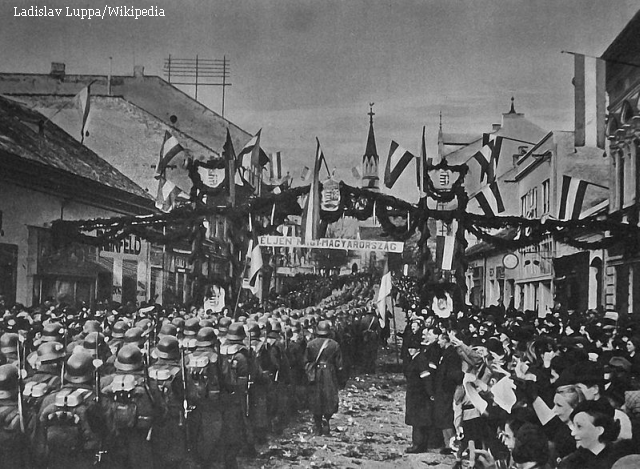The Vienna Arbitration
An outlook on the proceedings of the First Vienna Arbitration.

Steliu Lambru, 08.09.2014, 13:13
In the 1940s Romania promoted a foreign policy that was supposed to guarantee the integrity of its borders. As of 1938 Germany stood out as the European power calling the shots in Europe, while France and Great Britain adopted a more defensive policy. Therefore Romania decided to come closer to Germany, the only country that could guarantee its borders. However, the rapprochement took place later, after France capitulated in the summer of 1940. Hungary and Bulgaria, Germany’s allies, that had territorial claims over Romania, took advantage of their favorable status and asked to have their claims met. Gheorghe Barbul participated in the negotiations following which Romania had to concede northern Transylvania to Hungary in the summer of 1940. He recalled in an interview given in 1995 to the Center for Oral History of the Romanian Radio Broadcasting Corporation the circumstances of Romania’s rapprochement to Germany:
“I remember Hitler’s letter dated July 15, 1940, which was an answer to a letter sent by King Carol in which he offered Germany Romania’s friendship. It writes about territorial problems saying that Romania, at a time when it had a position of strength, annexed territories from its neighbors. Having lost that position, Hitler found it normal to negotiate an arrangement between Romania and Hungary, on the one hand, and between Romania and Bulgaria on the other. Romania had already lost Bessarabia. Hitler said that if an agreement was not reached, Germany would no longer show interest in what was going on in southeastern Europe, since Germany was strong enough to not need Romania’s oil. It was a kind of ultimatum, in the sense that Romania would remain on its own if it didn’t want to negotiate with its neighbors. And the threats from Russia, Hungary and Bulgaria were looming.”
Under these circumstances, Romania showed willingness to start negotiations with Hungary and Bulgaria. On August 16, 1940 negotiations were started in Turnu Severin (in the southern county of Mehedinti) between Romania and Hungary. The Hungarian delegation asked the Romanian delegation led by Valer Pop to concede a territory of 69 thousand square kilometers, with a population of 3.9 million inhabitants. The secretary of the Romanian delegation, Gheorghe Barbul, recalls the atmosphere during the talks:
“We were on a ship anchored in the port of Turnu Severin and were heading for the town hall headquarters or the prefect’s office to meet with the Hungarian delegation led by Count Hory. Talks lasted for 3 or 4 days, if I’m not mistaken. Each day was the same. The Hungarians would ask: What territories are you willing to surrender? To which Valer Pop, the head of the Romanian delegation, would give the same answer: it’s not a territorial dispute between Romania and Hungary, it’s rather a matter of nationalities. We surrender as much territory as needed for the exchange of population that could be made between Romania and Hungary. That is the Hungarians in central Transylvania, in Targu Mures or elsewhere would be transferred to the western Romanian border, in Crisana, and the Romanians would go to those territories from where the Hungarians left. The Hungarians would not accept Romania’s proposal and talks were protracted without an agreement being reached. Then the talks in Targu Mures were suspended with no positive result being obtained”.
Unhappy with the failure of the meeting, Hungary called on Germany and Italy to intervene to settle the conflict. On August 26, 1940, the German and Italian foreign ministers, Ribbentrop and Ciano, asked the two countries to come at a mediation meeting. Convened in Vienna, for the meeting with the Hungarian representatives, Romania was represented in the negotiations by its then foreign minister, Mihail Manoilescu. Gheorghe Barbul is back at the microphone with more:
“This was not a negotiation. Manoilescu, who headed the Romanian delegation, was presented with the new map of Romania. Seeing it, Manoilescu fainted and he needed medical care. There was nothing else to be done than informing the authorities in Bucharest, who hesitated to approve the new map. It took quite a while for the approval from Bucharest to reach Vienna. Meanwhile the Germans exerted a lot of pressure saying that there was an understanding between the Soviets and Hungarians, according to which, in case of failed negotiations in Vienna, they would undertake common military action against Romania. The rumor went that the Russians would go as far as the eastern Carpathians and the Hungarians would go deep into the heart of Transylvania. On August 24th the Germans had already told Romania that Soviet troops had been deployed on the Prut River. That seemed to be true, but not even today could one surely tell whether it was just blackmail or the mere truth”.
Irritated by the Romanians’ refusal to settle the conflict, Ribbentrop and Ciano threatened Manoilescu that a potential new refusal would have very serious consequences for Romania. The Crown Council convened in Bucharest and the participants gave 19 votes for and 10 against the arbitration of the Axis. The next day, at the Belvedere Palace, the 4 delegations concluded the arbitration act under which Hungary was granted the northern half of Transylvania. 4 years later, following tougher negotiations, northern Transylvania was returned to Romania.





























